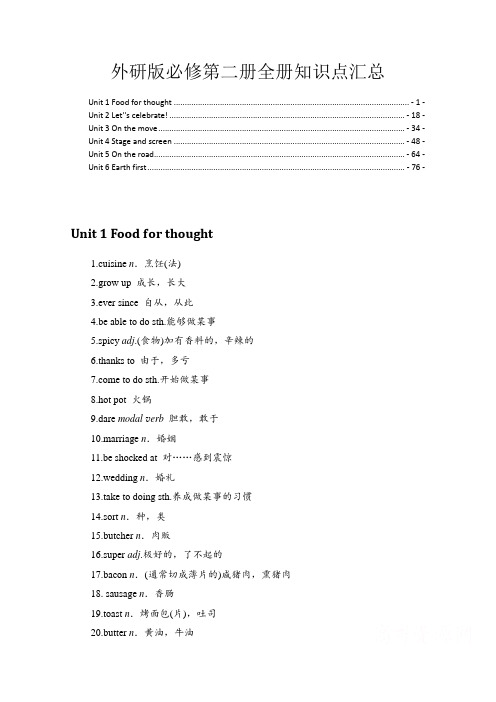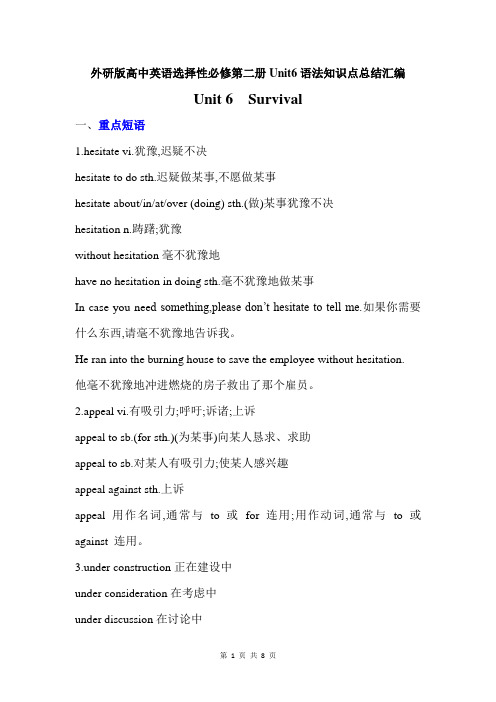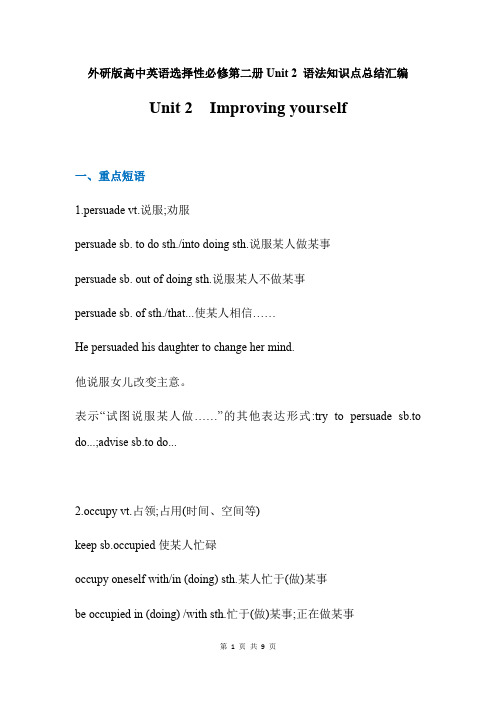外研版高中英语语法修订版
新教材 外研版高中英语必修第二册全册各单元知识点提炼汇总(单词短语句型语法等详解及扩展)

外研版必修第二册全册知识点汇总Unit 1 Food for thought ........................................................................................................... - 1 - Unit 2 Let''s celebrate! ........................................................................................................... - 18 - Unit 3 On the move ................................................................................................................ - 34 - Unit 4 Stage and screen ......................................................................................................... - 48 - Unit 5 On the road .................................................................................................................. - 64 - Unit 6 Earth first ..................................................................................................................... - 76 -Unit 1 Food for thought1.cuisine n.烹饪(法)2.grow up 成长,长大3.ever since 自从,从此4.be able to do sth.能够做某事5.spicy adj.(食物)加有香料的,辛辣的6.thanks to 由于,多亏e to do sth.开始做某事8.hot pot 火锅9.dare modal v erb胆敢,敢于10.marriage n.婚姻11.be shocked at 对……感到震惊12.wedding n.婚礼13.take to doing sth.养成做某事的习惯14.sort n.种,类15.butcher n.肉贩16.super adj.极好的,了不起的17.bacon n.(通常切成薄片的)咸猪肉,熏猪肉18.sausage n.香肠19.toast n.烤面包(片),吐司20.butter n.黄油,牛油21.get sb./sth.into...使某人/某物进入……22.typical adj.典型的,有代表性的23.had better (not) do sth.最好(不)做某事24.suffer v.(身体或精神上)受苦※suffer from 遭受……之苦25.according to 按照,根据26.encourage sb.to do sth.鼓励某人做某事27.deal with 应付,处理e across 偶遇,偶然发现29.stinky adj.难闻的,有臭味的30.tofu n.豆腐31.horrible adj.糟糕的32.gather v.聚集33.bite n.咬※take/have a bite 咬一口34.remind sb.of...使某人想起……35.cheese n.干酪,奶酪36.fall in love with 爱上,喜欢37.someday 将来有一天,有朝一日38.poison n.毒素,毒物,毒药39.feel at home with 对……感到舒适自在40.cross-cultural adj.跨文化的41.oolong n.乌龙茶42.china n.瓷,瓷料Words and Phrases知识要点1diet n.日常饮食vi.按照医生的规定饮食(教材P5)If you d are not try a “painful” diet to stay healthy,this new app is the perfect solution—and you needn't pay for it!如果你为了健康而不敢尝试一种“痛苦的”饮食,这个应用程序就是完美的解决方案——而且你不必付钱![例1]Everyone should try to reduce the amount of salt in our diet.大家都应该在饮食中减少盐的摄入量。
外研版高中英语必修三module3语法

5. He said, “Mother, the boy is very naughty.”
→He _____ very naughty. A. said his mother that the boy was B. said to his mother that the boy is C. told his mother that the boy was D. spoke to his mother that the boy
“Don’t be late again.”
→The teacher told the student not to be late again.
2. “Wake him up,” she said to me.
→ She told me to wake him up.
21
5. 过去时如有表示具体年份的状语,不 必改变时态。
2. “Have you seen the film?” he asked me.
→He asked me _______. A. had I seen the film B. have I seen the film C. if I have seen the film D. whether I had seen the film
→She asked whether we came from the same city.
19
3. 引语为特殊疑问句时,可以保留疑 问词,后跟陈述句。
1. He asked me, “Where are you going?”
→He asked me where I was going.
2. She asked him, “Whom do you want to see?”
外研版高中英语选择性必修第二册Unit 6 语法知识点总结汇编

外研版高中英语选择性必修第二册Unit6语法知识点总结汇编Unit 6 Survival一、重点短语1.hesitate vi.犹豫,迟疑不决hesitate to do sth.迟疑做某事,不愿做某事hesitate about/in/at/over (doing) sth.(做)某事犹豫不决hesitation n.踌躇;犹豫without hesitation毫不犹豫地have no hesitation in doing sth.毫不犹豫地做某事In case you nee d something,please don’t hesitate to tell me.如果你需要什么东西,请毫不犹豫地告诉我。
He ran into the burning house to save the employee without hesitation.他毫不犹豫地冲进燃烧的房子救出了那个雇员。
2.appeal vi.有吸引力;呼吁;诉诸;上诉appeal to sb.(for sth.)(为某事)向某人恳求、求助appeal to sb.对某人有吸引力;使某人感兴趣appeal against sth.上诉appeal 用作名词,通常与to 或for 连用;用作动词,通常与to 或against 连用。
3.under construction正在建设中under consideration在考虑中under discussion在讨论中under repair在修理中under control处于控制之下under debate在争论中under the umbrella of在……的保护下,在……的管理下If the antivirus program is out of date,you will need to update it.如果杀毒软件已经过时,你将需要更新。
Fires were burning out of control in the centre of the city.市中心的火势失去了控制。
外研版高中英语选择性必修第二册Unit 2 语法知识点总结汇编

外研版高中英语选择性必修第二册Unit 2 语法知识点总结汇编Unit 2 Improving yourself一、重点短语1.persuade vt.说服;劝服persuade sb. to do sth./into doing sth.说服某人做某事persuade sb. out of doing sth.说服某人不做某事persuade sb. of sth./that...使某人相信……He persuaded his daughter to change her mind.他说服女儿改变主意。
表示“试图说服某人做……”的其他表达形式:try to persuade sb.to do...;advise sb.to do...2.occupy vt.占领;占用(时间、空间等)keep sb.occupied使某人忙碌occupy oneself with/in (doing) sth.某人忙于(做)某事be occupied in (doing) /with sth.忙于(做)某事;正在做某事She is fully occupied in looking after three small children.=She is fully occupied with three small children.她忙于照料三个小孩。
3.pick up 捡起;拾起pick off摘下来pick out挑选,选出;辨认出;领会,理解4.constantly adv.持续不断地;经常地constant temperature恒温constant friend忠实的朋友He is constant to his purpose.他始终抱定目标。
She is a constant friend;you can rely on her.她是一位忠实的朋友,你可以依赖她。
5.embarrassed adj.窘迫的;尴尬的;害羞的embarrass sb.with sth./by doing sth.以……难住某人或使某人窘迫be embarrassed at/about such a request这样的请求使某人为难be embarrassed to do sth.因做了某事感到不好意思be embarrassed by sb.’s praise因为某人的表扬而感到窘迫embarrassing adj.使人害羞的/难堪的/惭愧的embarrassment n.害羞;困窘;难堪;困境不要问隐私让他们觉得不好意思。
外研版高中英语语法非谓语

外研版高中英语语法非谓语非谓语的奇幻之旅——以外研版高中英语语法为引嘿,伙计们!今天咱们要揭开一个在高中英语学习中既神秘又关键的角色——非谓语的大幕。
它就像一场变幻莫测的魔术秀,时而在句子里翩翩起舞,时而又藏匿于词组之间,让人捉摸不透,却又魅力无穷。
首先,踏上这场探索之旅,咱得先了解“非谓语”这号角色的真面目。
非谓语动词,简单来说就是那些不甘于平淡无奇充当句子主干的家伙,它们或以不定式(to do)、或以动名词(doing)、或以分词(done)的形式,赋予句子丰富的情感色彩和动态表达,可以说是英语语法世界里的“百变星君”。
就拿不定式to do来说吧,这家伙像极了初生牛犊不怕虎的少年,满载着梦想与可能,象征着未发生的动作或者目的。
你瞧,“I want to study abroad.”这句话中的"to study"就承载了满满的憧憬与期待,是不是生动有趣得很?再来说说动名词doing,这位老兄可就不那么冲动了,它更像一位经验丰富的叙事者,讲述的是正在进行的动作或是具有抽象概念的行为。
比如,“She hates doing homework.”这里的"doing homework"便描绘出一种持久的状态,充满了情感色彩。
最后出场的是分词done,此君堪称是故事里的幕后推手,常常用来表示已完成的动作或者与主语的关系密切。
例如,“Finished with the exam, he felt relieved.”这里的"Finished"就是过去分词,它悄悄地揭示了动作的先后顺序和因果关系,让整个句子层次分明,韵味十足。
在外研版高中英语语法的学习过程中,非谓语动词的运用如同七彩斑斓的调色板,能够使我们的语言表达更加细腻、立体。
然而,掌握它们并非一日之功,需要我们通过大量的阅读、实践以及不断的揣摩领悟。
每一次对非谓语动词的成功驾驭,都是一次语法技巧的提升,更是思维逻辑的锤炼。
2019外研版高中英语必修一Unit4 单元语法

Unit4 单元语法定语从句形式担任定语功能的句子叫定语从句。
定语从句在句中的作用相当于形容词。
被定语从句修饰的名词或代词叫先行词;连接先行词与从句的词叫关系词。
感知①The Tangshan earthquake was a terrible experience that my grandma cannot forget.②He is the man who lives next door.③The supplies which were provided for the disaster area were collected from around the country.④Mr. Li is an architect whose designs for the new town of Wenchuan have won praise.⑤Jeffrey is not such d intelligent person as you think.①—⑤为关系代词引导的定语从句。
用法一、关系代词引导的定语从句1. who指人,在定语从句中作主语或宾语,作宾语时可省略。
The girl who answered the phone was polite enough.接电话的那个女孩很有礼貌。
(作主语)The professor (who) you wish to see has gone abroad.你希望见的那位教授出国了。
(作宾语)2. whom指人,在定语从句中作宾语,有时可省略。
He is the man (whom) you have been looking for.他就是你一直在找的那个人。
3. whose既可以指人,也可以指物,在从句中作定语。
This is the woman scientist whose name is known all over the country.这就是那位闻名全国的女科学家。
外研版高中英语语法修订稿
外研版高中英语语法 WEIHUA system office room 【WEIHUA 16H-WEIHUA WEIHUA8Q8-第1讲 简单句的五种基本结构英语句子的基本结构可以归纳成五种基本句型及其扩大、组合、省略或倒装。
掌握这五种基本句型,是掌握各种英语句子结构的基础。
英语五种基本句型结构如下:主语 谓语 用符号表示为: ① S V (主+谓) ② S V O (主+谓+宾)③ S V o O (主+谓+间宾+直宾)④ S V O C (主+谓+宾+宾补)⑤ S V P (主+系+表)主语(subject )谓语(predicate ) 宾语(object )定语(attribute ) 状语(adverbial)补语(complement ) 表语(predicative )考点1. 基本句型 一:S V (主+谓)这类句子的谓语动词都是不及物动词,都不带宾语,但可以带状语,常见的不及物动词有: act, come, go, work, last, fall, cry, disappear, appear, smile, rise, ring, live, look, listen, laugh, hurry, talk, sleep, graduate, die, care, agree, jump, fail, wait, succeed, stay, sit, lie, shine, happen, take place, rain, snow, ect. 如:It is raining now. (S V)We've worked for 5 hours. (S V)The meeting lasted half an hour. (S V)Time flies. (S V)练习1.分析下列句子成分,并在后面括号内标明属于五种基本句型中的哪一种 1.Dark clouds hung overhead. ( ) 2.Gradually a smile appeared on her face. ( ) 3.He is smiling all over his face. ( ) 4.I did well in English. ( ) 5. He talked loudly in the classroom yesterday. ( ) 考点2. 基本句型 二: S V P (主+系+表)系动词主要是be. 但还有一些动词有些时候也可作系动词,有人称之为半系动词。
外研版必修一module4Grammar现在完成时语法(共39张PPT)
4. 现在完成时可以用在条件或时间状语 从句中, 表示将来某个时刻之前已经完 成的动作。
e.g. I’ll go home as soon as I have finished my homework. Please lend me that book if you have finished reading it.
for a long time. _H__a_s_ he _m_o_v_e_d_ (move) to a new neighborhood?
Kate: No, he _h_a_s_n_’_t m__o_v_e_d_ (move) to a new country! Heh_a_s__b_e_e_n__ (be) in Australia _si_n_c_e__ last year.
Exercise
选用 for和 since填空:
1.We haven’t seen each other __fo__r__ a long time. 2.His father has been in the Party _s_i_n_c_e_ 10 years
ago.
3.The film has been on __fo_r___ 20 minutes. 4.Mr Green has worked here _s_i_n_c_e_ he came to
2. 延续性动词: 表示长时间的运动状态, 能和表示一段时间的状语连用。 常用的动词有: live, study, work, teach, stay, read, play, fly, talk, rain, eat, run等。
新教材 外研版高中英语必修第一册全册各单元知识点提炼汇总(单词短语句型语法等详解及扩展)
外研版必修第一册全册各单元知识点汇总Unit 1 A new start .................................................................................................................... - 1 - Unit 2 Exploring English ....................................................................................................... - 15 - Unit 3 Family matters ............................................................................................................ - 29 - Unit 4 Friends forever............................................................................................................ - 44 - Unit 5 Into the wild ................................................................................................................ - 57 - unit 6 At one with nature........................................................................................................ - 65 -Unit 1 A new start重点单词1.picture vt.想象;描写2.over and over again反复地3.wake up醒来wake的过去式为woke,过去分词为woken,现在分词为waking。
外研版高一必修1语法共49页文档
谢谢你的阅读
❖ 知识就是财富 ❖ 丰富你的人生
71、既然我已经踏上这条道路,那么,任何东西都不应妨碍我沿着这条路走下去。——康德 72、家庭成为快乐的种子在外也不致成为障碍物但在旅行之际却是夜间的伴侣。——西塞罗 73、坚持意志伟大的事业需要始终不渝的精神。——伏尔泰 74、路漫漫其修道远,吾将上下而求索。——屈原 75、内外相应,言行相称。——韩非
ห้องสมุดไป่ตู้
外研版高一必修1语法
36、如果我们国家的法律中只有某种 神灵, 而不是 殚精竭 虑将神 灵揉进 宪法, 总体上 来说, 法律就 会更好 。—— 马克·吐 温 37、纲纪废弃之日,便是暴政兴起之 时。— —威·皮 物特
38、若是没有公众舆论的支持,法律 是丝毫 没有力 量的。 ——菲 力普斯 39、一个判例造出另一个判例,它们 迅速累 聚,进 而变成 法律。 ——朱 尼厄斯
- 1、下载文档前请自行甄别文档内容的完整性,平台不提供额外的编辑、内容补充、找答案等附加服务。
- 2、"仅部分预览"的文档,不可在线预览部分如存在完整性等问题,可反馈申请退款(可完整预览的文档不适用该条件!)。
- 3、如文档侵犯您的权益,请联系客服反馈,我们会尽快为您处理(人工客服工作时间:9:00-18:30)。
外研版高中英语语法 Company number:【WTUT-WT88Y-W8BBGB-BWYTT-19998】第1讲 简单句的五种基本结构英语句子的基本结构可以归纳成五种基本句型及其扩大、组合、省略或倒装。
掌握这五种基本句型,是掌握各种英语句子结构的基础。
英语五种基本句型结构如下:主语 谓语 用符号表示为: ① S V (主+谓) ② S V O (主+谓+宾)③ S V o O (主+谓+间宾+直宾)④ S V O C (主+谓+宾+宾补)⑤ S V P (主+系+表)主语(subject )谓语(predicate ) 宾语(object )定语(attribute ) 状语(adverbial)补语(complement ) 表语(predicative )考点1. 基本句型 一:S V (主+谓)这类句子的谓语动词都是不及物动词,都不带宾语,但可以带状语,常见的不及物动词有: act, come, go, work, last, fall, cry, disappear, appear, smile, rise, ring, live, look, listen, laugh, hurry, talk, sleep, graduate, die, care, agree, jump, fail, wait, succeed, stay, sit, lie, shine, happen, take place, rain, snow, ect. 如:It is raining now. (S V)We've worked for 5 hours. (S V)The meeting lasted half an hour. (S V)Time flies. (S V)练习1.分析下列句子成分,并在后面括号内标明属于五种基本句型中的哪一种 1.Dark clouds hung overhead. ( ) 2.Gradually a smile appeared on her face. ( ) 3.He is smiling all over his face. ( ) 4.I did well in English. ( ) 5.He talked loudly in the classroom yesterday. ( )vi. vt . . 宾语 宾语(间)宾语(直)宾语 宾语补足语 表语 ① ⑤ ② ④ ③考点2.基本句型二:SVP(主+系+表)系动词主要是be. 但还有一些动词有些时候也可作系动词,有人称之为半系动词。
I.如何辨别系动词有些动词既可作连系动词,又可以作实义动词。
如何来辨别呢有一个最简便的方法,即用连系动词be替换句子中的这些动词,句子仍然成立就是连系动词;反之,不能替换的,就是行为动词。
如:①She looks beautiful. (looks变为is之后,她是美丽的,句意没有大的变化,looks是系动词)。
②Look at the picture.(look不能换为be, look为实义动词。
)③He felt the book with his right hand.(feel是“摸”的意思,不能换为was, 是实义动词)。
④The silk feels soft.(这种丝绸摸起来很柔软,feels换为is之后,句意变化不大,因此是系动词。
)练习2.辨别下列粗体动词是系动词还是实义动词1.The door stays open at night.2.He tasted the food, and the food tasted delicious.3.The book still lies open on the desk.4.What he said proved true..5.He can’t proved his theory(理论).II.常见的系动词①状态系动词②用来表示主语状态,只有be一词,例如:③He is a teacher. 他是一名教师。
④持续系动词⑤用来表示主语继续或保持一种状况或态度,主要有keep, remain, stay, lie, stand, 例如:⑥He kept silent at the meeting. 他开会时保持沉默。
⑦This matter remains a mystery. 此事仍是一个谜。
⑧The food stays fresh in the fridge.⑨食物在冰箱里仍然很新鲜。
⑩The house stood empty for years.房子空了数年。
⑪He lies awake in bed.他躺在床上,醒着。
⑫表“像”系动词⑬用来表示"看起来像"这一概念,主要有seem, appear, look, 例如:⑭Something seems wrong. 好像出差了。
⑮He appears young. 他看起来很年轻。
⑯感官系动词⑰感官系动词主要有look看起来,feel摸起来, smell闻起来, sound听起来, taste尝起来:⑱This kind of cloth feels very soft.⑲这种布手感很软。
⑳This flower smells very sweet.21这朵花闻起来很香。
22变化系动词23这些系动词表示主语变成什么样,变化系动词主要有become, grow, turn, fall, get, go, come, run.24He became mad after that. 自那之后,他疯了。
25She grew rich within a short time.26她没多长时间就富了。
27He fell ill yesterday.他昨天病了。
28Eggs go bad easily in spring.鸡蛋夏天容易变坏。
29His face went red.他的脸变红了。
30What he had dreamt of came true.31他的梦想实现了。
32Still waters run deep.静水流深。
33终止系动词34表示主语已终止动作,主要有prove, turn out, 表达"证实","变成"之意,例如:35The rumor proved false. 这谣言证实有假。
36His plan turned out a success.37他的计划终于成功了。
(turn out表终止性结果)38What he predicted turned out (to be) wrong.39他预言的结果是错的。
练习3.用下划线划出下列句中的系动词。
1.His advice proved right.2.The shop stays open till 8 o’clock.3.The machine went wrong.4.All these efforts seem in vain.5.These words sound reasonable.6.The room soon became crowded.7.The days are getting longer and longer.8.He fell ill yesterday.9.Trees turn green in spring.10.What you said sounds great.III.系动词不能单独作谓语,要和表语一起作谓语He is a student. (SVP)Your idea sounds great. (SVP)IV.在一个英语单句中,一般情况要有谓语动词。
要注意:介词短语和形容词不能单独做谓语,要和系动词一起做谓语。
改错:①Our school very beautiful and we like it very much.②Your book on the desk.写作专练1.不要忘了使用系动词1.那食物很可口,我吃了很多。
(the food, delicious)2.那个电影好极了。
(the movie, fantastic)3.不过呢,一些人反对这个计划。
(however, against, the plan)4.他们的意见如下。
(their opinion, as follows)5.就我而言,我赞成这个主意。
(as far as I’m concerned, in favor of)1.他让我们看了一张世界地图。
(show)2.请把熊猫的照片寄给我一张。
(send, a photo of the panda)考点3.基本句型三:SVO(主+谓+宾)此结构是由“主语+及物动词(词组)+宾语”构成。
宾语可以是名词、代词、数词,动名词、动词不定式或词组、the +形容词、分词以及从句等。
如,She likes English.We planted a lot of trees on the farm yesterday.练习4.用下划线划出下列句中的宾语。
1.People all over the world speak English.2.Jim cannot dress himself.3.All of us believe that Jack is an honest boy.4.He did not know what to say.5.He just wanted to stay at home.6.He practices speaking English every day.考点4.基本句型四:SVoO(主+谓+间宾+直宾)有些及物动词可以有两个宾语,如:give给,pass递,bring带,show显示。
这两个宾语通常一个指人,为间接宾语;一个指物,为直接宾语。
间接宾语一般位于直接宾语之前。
一般的顺序为:动词 + 间接宾语 + 直接宾语。
如:He gave me a cup of tea. (SVoO)强调间接宾语顺序为:动词 + 直接宾语 +介词+ 间接宾语。
如:Show this house to Mr. Smith.若直接宾语为人称代词:动词+ 代词直接宾语 +介词+ 间接宾语。
如:Bring it to me, please. (不能说 Bring me it, please。
)常跟双宾语的及物动词有:(需借助to的)allow, bring, deny, give, grant, hand, leave, lend, offer, owe, pass, pay, permit, promise, read, refuse, sell, send, show, teach, tell,wish, write等(需借助for 的) buy, choose, fetch, get, make, order, paint, play(演奏),save, sing, spare等『一般用to多些,用for的记住常用的三个就行:get, buy, make』He sent me an English-Chinese Dictionary.= He sent an English-Chinese Dictionary to me.She bought John a book.= She bought a book for John.练习5.分析下列句子成分,口头说出间接宾语和直接宾语。
